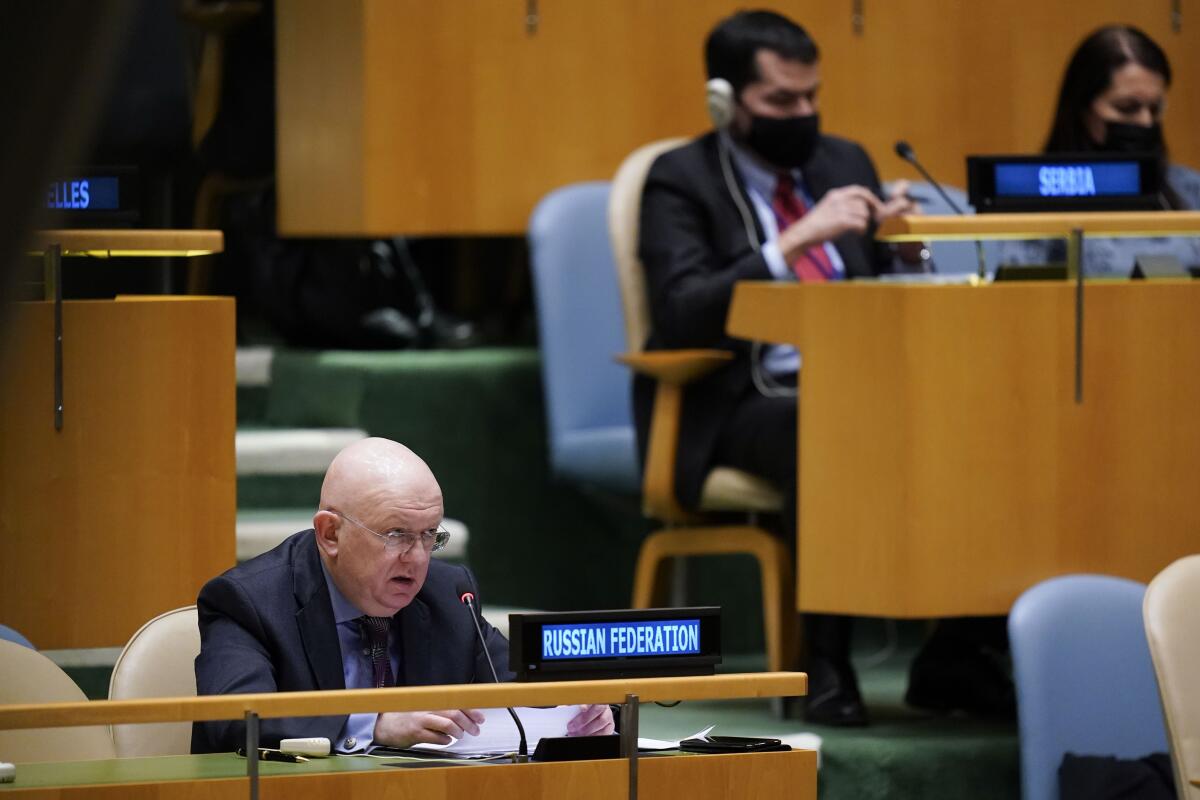Op-Ed: The U.N. should kick Russia off the Security Council

The Russian invasion of Ukraine has changed the world. While Ukrainians try to defend themselves and call for collective self-defense, millions of people in the free world plead for action. The post-World War II international political order is failing. But it has not yet fallen: The United Nations still can take action to regain moral standing and to secure the sovereignty and territorial integrity of Ukraine and all other member states.
The U.N.’s main purpose is to maintain international peace and security, but it did not prevent the full-scale brutal war now happening in Ukraine, nor did it prevent or punish Russia’s unlawful seizure of Crimea and its occupation of Donbas in 2014.
The organization’s final insult to Ukraine and everyone horrified by its treatment has been Russia’s role presiding over the Security Council. From this soapbox, the highest stage in the world, the Russian ambassador has amplified the Kremlin’s propagandistic narrative for weeks.
By giving this platform, the U.N. has conveyed legitimacy for Russia and done real harm to Ukrainians and to world peace. That need not be its legacy. The U.N. can now be part of the solution.
Sergiy Kyslytsya, the Ukrainian ambassador to the United Nations, gave an emotional speech on Feb. 24, pointing to a provision in the U.N. Charter intended to deal with members that persistently violate U.N. principles. According to Article 6, such members may be expelled from the organization by the General Assembly upon the recommendation of the Security Council.
Because any one of the permanent members of the Security Council — the United States, Russia, China, Britain and France — can veto any action the council considers, it is clear this provision was not designed to be employed against any of those five.
However, by the time of Kyslytsya’s admonition, it was becoming impossible to ignore the Russian Federation’s persistent and blatant violation of principles of international law and the deceitful manipulation of legal norms.
There is a path forward, however, without Security Council unanimity, following the “Uniting for Peace” resolution model from 1950.
The Ukraine ambassador’s appeal deserves a response. The United Nations is holding an emergency session of the General Assembly, something that has happened only 10 times since the first major deadlock of the Security Council. On Wednesday, 141 states demanded that Russia immediately, completely and unconditionally withdraw all of its military forces from the territory of Ukraine within its internationally recognized borders.
Further and substantially more action is needed. This time, the emergency session should go well beyond any of the previous 10. Although this would admittedly stretch the terms of the U.N. Charter, there is nothing to stop the General Assembly from enacting reforms that would be needed to expel Russia from the Security Council.
Keeping Russia in this inner circle has yielded no benefit for the international community. The U.N. is not restraining the Kremlin’s belligerence thus far, and we have no reason to believe that it ever will if Russia continues to have veto authority.
Removing Russia from the Security Council would signal an end to the impotent response to the aggression, autocracy and nuclear threat. It would signal that the U.N. didn’t abandon its main purpose. At this point, the expulsion of Russia is not mere punishment. It is lifesaving necessity.
The time for condemnation, punishment and expectations of changes in Russian behavior has long since passed. By the time Russia massed more than 190,000 troops at the Ukrainian border, the international community was well aware of the imminent threat to Ukrainian sovereignty. Such action by Russia was again in direct contravention of the Budapest Memorandum on Security Assurances for Ukraine, signed by Russia, the U.S. and the United Kingdom in 1994.
The hope in ousting Russia from the Security Council would be to restore peace through the employment of a collective self-defense mechanism that would secure Russian withdrawal of military forces from Ukraine, based on borders that were internationally recognized when the sovereign republic gained independence in 1991.
Moreover, emasculation of Russia as a player with veto power is essential to render Russian President Vladimir Putin and others subject to the jurisdiction of the International Criminal Court for the crime of aggression.
In the 20th century, when people talked about reforming the U.N., it was an academic exercise. Today, changes are simply unavoidable. We are at the point of no return.
Failing to heed the prescient adage of philosopher George Santayana and ignoring the Nazi invasion of Poland in 1939 is to fail to learn the lesson of history, thus condemning us to repeat it. But there is still time to prevent a complete collapse of the international order; the U.N. need not crumble as did the League of Nations.
The Ukraine crisis offers an opportunity for the U.N. to preserve its relevance and reshape itself in a way that would provide security for the entire global community. If the General Assembly convenes in an emergency session and takes decisive action, we will have reason to hope.
Will the United Nations assume the necessary leadership to stop the aggressor, employ all meaningful tools for reestablishing peace and hold the perpetrators accountable? Or will it leave members embroiled in a brutal war in the center of Europe?
As Kyslytsya stated in his speech on the first day of the U.N. emergency session, if Ukraine falls, the U.N. will fall. If the U.N. can assert its moral standing, it will organize its members to save Ukraine and the significance of democracy. The fates of Ukraine and of the global community are entwined.
Iryna Zaverukha, former deputy dean of law at Ivan Franko National University of Lviv in Ukraine, teaches public international law and international criminal law at Southwestern Law School in Los Angeles.
More to Read
A cure for the common opinion
Get thought-provoking perspectives with our weekly newsletter.
You may occasionally receive promotional content from the Los Angeles Times.










